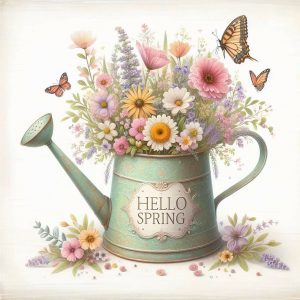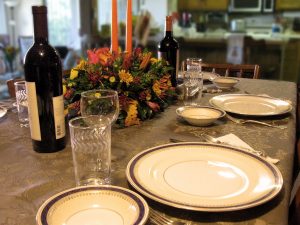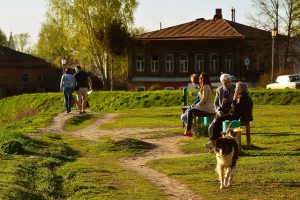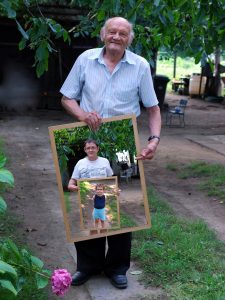News & Articles

A Springtime Surprise: 8 Ideas for springtime activities with loved ones who have dementia
As the weather warms, and the trees and flowers leaf-out and bloom, it’s a lovely time to get outside. Especially after our long and rainy winter. Melanie Donohue, LCSW (of Blue Moon Senior Counseling in Plainfield, Illinois) offers eight ideas for enjoying the out-of-doors with our loved ones who have dementia. They are her ideas, but we have tweaked them to better fit our neck of the woods.
- Take a Nature Walk. Our town is a treasure trove of easy outdoor paths, lake walks, beach walks, and gentle hillside strolls. Be sure to check out the area first to be sure they are accessible, easy to navigate, and free of fall hazards. Plant identification and bird watching are both fun to do on these nature walks.
- Have a Picnic in the Park. Parks abound in our fair city, and they are usually full of laughing children, dogs of every description, and comfortable places to sit and enjoy the day. Pack an old-fashioned basket with your loved one’s favorite sandwiches and plenty of water.
- Attend an outside event. Springtime means craft fairs, outdoor concerts, and farmers’ markets. Be sensitive to your loved one’s tolerance for noise, commotion, and crowds. Visit during off-peak hours to avoid the big crowds. Or have an easy exit if it gets too hectic.
- Play in the Garden. Taking care of plants can be very rewarding for people with dementia. Though gardening can be challenging for older folks with arthritis and joint pain, adaptive gardening tools and raised beds and benches can help. Or you could start an indoor herb garden together.
- Craft & Color. Springtime inspires the artist in all of us with its gorgeous colors and brand new life coming up everywhere. Create hand-made greeting cards, fill in spring-themed adult coloring books, or hand-paint flower pots. Painting pottery can be very relaxing – for both of you!
- Plan a Potluck. Spring is a great time to gather with family and friends in the backyard or on the patio. Social interaction is important for those with dementia, but be aware that all that effort might be tiring, so be sure there is a quiet place for them to withdraw.
- Reminisce. This is a meaningful experience any time of year, but here are some springtime questions to get you started.
- What springtime activities did you do as a child?
- How did you celebrate Easter?
- Did you play or watch baseball?
- What was school like in the springtime?
- What was the weather like where you grew up?
- Spring Cleaning. Even small-scale spring cleaning can offer your loved one ways to feel productive. Sorting and organizing mementoes can open the door for reminiscing; maybe they can help you decide what to keep and what to toss. Dusting and polishing are other tasks that can be both engaging and rewarding.
Springtime awakens the best in all of us, including your loved ones with dementia or Alzheimer’s. Get out in nature, and recognize the hope and happiness to be found!


As the winter holiday season gives way to the promise of Spring, Valentine’s Day offers a sweet bridge to the new year. And it’s a wonderful time to renew your love for those who have Alzheimer’s Disease. Writer Lutgarda Mariano of Canada’s Home Care Assistance in Victoria, British Columbia offers some tried and true activities you can do with your loved one to mark the famous lovers holiday.
“The same interests that gave your loved one pleasure in the past could stir memories and reduce anxiety in the present,” she writes. If he or she has always enjoyed celebrating Valentine’s Day, encourage him or her to continue that tradition, she explains.
- Create Flower Arrangements – This is not just fun, but it also fosters a sense of accomplishment. You can use freshly picked flowers from your home garden, or stop by the florist and buy a nice assortment and a vase or two to make your own bouquet.
- Make Sweet Treats Together – If you have access to a kitchen (either at home or in a care community), cooking can activate the senses and promote social bonding and self-expression for those with dementia. If you are concerned about adding too much sugar to their healthy diet, choose heart-shaped, whole grain pancakes or chocolate-dipped bananas or strawberries.
- Watch old Videos or look through old Photo Albums – Looking at old photos or videos, especially those featuring past Valentine’s Days, can help trigger pleasant memories for seniors with dementia, and help them foster emotional connections with others.
- Play Romantic Songs – “Key brain areas are often linked to musical memory and often go undamaged,” writes Mariano. Playing their favorite love songs can evoke happy memories and “listening to music can boost your loved one’s mental and emotional wellbeing,” she explains, “and it also reduces stress, anxiety, agitation, and violent behavior.”
- Make Homemade Valentine’s Cards – Collect all the materials you’ll need: red construction paper, white lacy trim, scissors, tape, pens etc and make them together. “Making homemade cards can help seniors with Alzheimer’s increase their concentration while connecting with past memories,” says Mariano. “And passing them out to friends and family members may help your loved one with dementia feel more engaged with life.”
I really love this quote from the great Katharine Hepburn about love:
“Love has nothing to do with what you expect to get – only with what you expect to give – which is everything.” 

A Brand New Year Brings Brand New Hope for those with Alzheimer’s Disease
At the University of Virgina (UVA), a trail-blazing professor is busy perfecting an implant that, if successful, will have a major impact on Alzheimer’s sufferers. In an article written by Eric Williamson for UVA Today, this cutting-edge device is described in detail—offering new hope in the new year for those afflicted, and for those who love and care for them.
Dr. Harald Sontheimer, professor and chair of neuroscience at the UVA School of Medicine, founded the nation’s first School of Neuroscience at Virginia Tech. Author of the award-winning textbook “Diseases of the Nervous System,” Sontheimer is a leading innovator in brain cancer research. He and his team are excited to be creating a multi-purpose device that gives a better real-time image of a patient’s situation while also serving as a conduit for treatment.
Sontheimer’s team includes Virgina Tech’s Xiaoting Jia, and Washington University’s Song Hu, who are putting the finishing touches on the fiber-based implant, which is a little smaller than a human hair, Williamson writes. The National Institute of Health awarded the team of Hu, Jia, and Sontheimer a one-year grant that they hope will be expanded for the next five years in order to complete the project.
This leading-edge work will not only promise to treat or even reverse the degenerative effects of Alzheimer’s Disease, but will also help to settle a long-standing dispute about the actual cause of the disease. For details about this new device, its development, function, and future implications, please read the article in its entirety, at https://news.virginia.edu/content/uva-tests-viability-alzheimers-implant-2024-may-be-year-hope#
Thanks to the generous support of the public for the many organizations that support Alzheimer’s research, 2024 might just be the year when these arduous research efforts finally pay off. Happy New Year!


It’s the Most Wonderful Time of the Year!
That song lyric is so true for so many, and your loved one with dementia may be one of them. The Alzheimer’s Society of the United Kingdom (www.alzheimers.org.uk) has provided 8 ways to make the holiday truly wonderful for them … and for you.
- Put decorations up gradually. Think about putting them up slowly over several days so it doesn’t come as a big change all at once to your loved one’s usual setting. Some people even get started the day after Thanksgiving. Incorporate the old, familiar wreaths and ornaments they might recall from their childhoods or while raising their children.
- Keep it simple and familiar. Those with dementia may feel easily overwhelmed over the holiday season, so it’s best not to overdo it. Stick to their regular routine wherever possible, with meals at their regular times and in a familiar place. Keep the day’s activities low-key, with lots of time to relax. If they used to go to church but are now unable to, consider online or televised services.
- Get everyone involved. There are many little ways to include your loved one with dementia in the holiday spirit. From something as simple as hanging a bauble on the tree to joining in a Christmas carol sing-along are easy ways to make them feel included. Sticking labels on envelopes for Christmas cards, or even making one or two special hand-made cards can be fun ways to involve them in holiday preparations.
- Create a quiet area. Be sure to designate one room or space in the house where your loved one can relax when things get a bit too noisy or chaotic.
- Bring back old memories. Whether it’s an old holiday song or favorite Christmas movie, this time of year is a great one for rekindling old memories. Making a family photo album or memory box together is a lovely way to share time with them. Remember to avoid doing things that might trigger upsetting memories, or people they miss. Some of you can create files of photos (or even a whole tablet or i-pad designated for just this purpose) that you can update and caption with people, places, and events that are dear to them.
- Be mindful of food. Most of us tend to over-eat throughout the holiday season, especially on Christmas Day. But a full plate can be daunting for someone who has difficulties eating. Small portions of holiday favorites is a better way to go. And don’t overdo the sweets.
- Be flexible. Though it’s easy to get caught up in “the way things have always been done,” it’s always worthwhile to have a Plan B, and be prepared to change your plans if a particular element isn’t working. Don’t take it personally if all your best-laid plans go awry.
- Plan ahead. Consider minimizing situations where your loved one is called upon to remember names. As guests arrive, you might give them a gentle reminder, or ask the newcomer to introduce themselves. Speaking with family members in advance, especially young children, may help avoid embarrassing moments for them. If your loved one lives in a memory care community, it can be helpful to find out what their plans are, any restrictions they might have, who can visit and for long etc.
The true spirit of Christmas is all about the arrival of new hope, a new chance to express love and good will, and the great joy of being together. With a little thoughtful planning, it really can be the most wonderful time of the year!


Thanksgiving for Everyone …
So much to be thankful for this Thanksgiving Season! As Alzheimer’s Disease and other dementias become more and more prevalent among our growing senior population, here’s another wonderful resource for those who love them: It’s caregiver.com – a website with a wealth of helpful information for anyone caring for loved ones who have a diagnosis. The organization has a magazine called Today’s Caregiver and below are some exceptional tips (excerpted from their November 2022 article) for celebrating Thanksgiving to accommodate those with dementia.
- Prepare your guests: Consider sharing helpful information with your guests, such as best ways to communicate with the person, what they respond well to, what might cause distress. This will help foster positive interactions.
- Factor in the person’s routine into your planning. Changes in daily routine can be challenging for someone living with dementia. So try to plan your day around that routine. For example, if the person usually takes an afternoon walk, build in time for that.
- Start the celebration early. People living with dementia are prone to “sundowning,” a syndrome that can cause agitation and confusion in the later afternoon-evening as the sun sets. This can be compounded by a houseful of guests. Consider starting the celebration earlier in the day to avoid running into this common problem.
- Ask for help. Preparing for and holding a holiday gathering can be stressful enough without the added responsibility of caring for a loved one with dementia. Relatives and friends are often eager to help but don’t know how. Don’t be afraid to give them specific directions, like bring a specific dish, help with cooking, shop, or decorate. They could even spend time with your loved one while you are busy.
- Keep your loved one involved. Make adaptations that enable your loved one to be a part of things. Focus on what they can do easily, like setting the table. Play familiar music, start a sing-along of tunes they will remember from their past.
- Have a quiet space available. Prepare a quiet place away from the crowd where the person with dementia can go if the party becomes too much for them. Place familiar items there (blanket, sweater, stuffed animal). Try to control the flow of visitors where possible.
A little pre-planning can go a long way toward making your family holiday gathering a happy one – one that includes everyone!


Tips (not Tricks) for celebrating Halloween with Loved Ones Who Have Dementia
Straight from the Alzheimer’s Association, and with generous help from an article posted by Eagle Senior Living, here are some important tips for getting through what can be a truly frightening holiday for those who suffer from dementia.
For those who suffer from Alzheimer’s Disease or others forms of dementia, change of any kind— especially changes in daily routine—can bring on a whole smorgasbord of unwanted behaviors. Not to mention the damage it does to their emotional well-being. For many, the added scary stimulation of wild costumes, demands for candy, and spooky décor can make Halloween confusing, even terrifying. Here are just a few things to avoid, either at home or at a memory care community—along with some ideas for how to celebrate the holiday in a fun and gentle way.
Decorating: People love to transform their homes with spiderwebs, skeletons, and toothless carved pumpkins for the whole month! It’s tradition. But those with dementia often cannot tell the difference between what’s real and what’s make-believe. Don’t expose them to even more distress than they are already feeling. Keep the decorating to a minimum or decorate with fall beauty instead.
Fear and confusion is common among people who have dementia, especially as their disease progresses. In the middle of their illness, many have trouble recognizing friends and family members. Imagine how much scarier it would be to see them all wearing masks! Don’t … for their sakes.
If your loved one is still at home, try to avoid a rush of unfamiliar houseguests. Keep their home environment as free from perceived threats as possible.
Plan ahead: Go for a lovely fall ride to see the colorful leaves or the local pumpkin patch, versus Halloween parties or parades.
Keep a watch on what your loved one is watching on television. This time of year, Dracula, werewolves, and Frankenstein dominate the small screen and can be especially disturbing for them. Instead, find other ways to occupy their time so they’ll be less likely to come across something that will trigger their worst fears.
For example, bake a pumpkin pie, decorate cookies with orange and black sprinkles, paint gourds together, or put fall flowers in pretty vases. Replace ghosts and goblins with horns of plenty or bowls full of pinecones. Go apple picking! There’re ample apple farms in our neck o’ the woods! And there’s nothing like a hot cup of spiced cider on a cool crisp Halloween day.
Above all – give your loved one the gift of time. That’s the best Halloween treat of all. Happy All Saints Day, everyone!

Autumn maple tree leaves full frame arrangement with many colorful leaves

A Bright New Focus and an Important Review
This month’s article comes to you from BrightFocus.org, which funds exceptional scientific research worldwide to defeat Alzheimer’s disease, macular degeneration, and glaucoma, and provides expert information on these heartbreaking diseases.
While the Alzheimer’s Association offers comprehensive information on the latest developments, BrightFocus is another wonderful resource with its own cadre of brilliant researchers, offering even more for us to explore and learn from. What follows is an excellent review of the signs, symptoms, and stages of Alzheimer’s Disease taken directly from the BrightFocus website.
Alzheimer’s Disease usually progresses gradually, lasting 2 – 20 years, with an average of 7 years in the U.S. … The stages of clinical diagnosis and their symptoms include:
Mild (Stage 1): Early in their illness, people with Alzheimer’s disease may:
- Be slow in their speech and understanding
- Experience minor memory loss and mood swings
- Have difficulty learning new things
- Lose energy and spontaneity, although others may not notice
- Lose their train of thought mid-sentence
- Still perform basic activities but need assistance with more complicated tasks
Moderate (Stage 2): At this stage, a person with Alzheimer’s begins to be disabled by the disease.
- Although individuals with Alzheimer’s can recall the distant past, recent events are difficult for them to remember.
- They may have difficulty comprehending day, time, and location.
- They may invent new words as they lose old ones.
- They may not recognize formerly familiar faces.
Severe (Stage 3): In this final stage, Alzheimer’s patients:
- Are unable to chew and swallow
- Become bedridden and vulnerable to pneumonia and other illnesses
- Become more and more unresponsive
- Lose bodily control and need constant care
- Recognize no one
The importance of a Physician Evaluation
If you suspect that you or a loved one has a memory problem, you want to seek advice and a thorough evaluation by a physician with extensive knowledge, experience, and interest in dementia and memory problems. It’s important to get early medical attention for two reasons:
- The physician can rule out other possible causes of memory loss that warrant their own treatment, such as Parkinson’s Disease, drug interactions, head injury, infections, or nutritional or metabolic disorders
- A doctor may prescribe certain medications to help slow the progression or alleviate some of the symptoms of the disease. Treatments are most effective in the earlier stages, so early screening and diagnosis are important!
Please visit brightfocus.org for more breakthrough information and compassionate advice. # # #

In the Good Old Summertime … ideas for sharing summer days with your loved one who has dementia
The California Caregiver Resource Centers are a network of eleven independent non-profit organizations across California. They were created with you in both mind and heart to be a free resource as you navigate the challenging role you’re in. The following ideas were lifted right from their website: caregivercalifornia.org.
Whether you are caring for someone at home or in a memory care community, these are wonderful ideas for sharing quality time this summer.
- Put together a summer activities package, including things like a picnic blanket, sunscreen, bug spray, sunglasses, a hat, and their favorite snacks.
- Go for a walk in the park together. Make sure to point out any interesting sights, smells, and sounds along the way.
- Take a trip to the beach. Notice the feel of the sand between your toes, the sound of the waves crashing against the shore, and the smell of the salt in the air. These can be calming and invigorating.
- Head to a nearby museum or art gallery. Take your time … stop at each exhibit. If your loved one is feeling chatty, strike up a conversation about what you are seeing.
- Plan a picnic in your backyard or at a nearby park. Be sure to include their favorite foods and drinks.
- If you have an ice cream-maker (you can get ‘em pretty cheap these days), whip up some homemade ice cream together.
- Go for a drive and take in the scenery. If your loved one is up for it, make some stops along the way to explore a new place or two.
- Play tourist in your own town or city. Visit some of the local landmarks and attractions you might take for granted. They might trigger old memories or make you appreciate the things you haven’t given a second thought to in a while.
Of course, it’s important to tailor these activities to your loved one’s abilities and interests. But dementia doesn’t mean you can’t do things together. Summertime might just be the perfect season to enjoy these warm sweet days together. # # #


Three Good Reasons to be Optimistic
This summer, the Alzheimer’s Association is just full of good news about the strides being made toward treatment, support, and ultimately, a cure for a disease that currently affects more than 6 million people in the U.S. alone. Alzheimer’s Disease is a leading cause of death in this country, and there are more than 11 million friends and family members providing unpaid care for those living with it.
In June, an Advisory Committee to the Food and Drug Administration unanimously endorsed the efficacy and clinical benefit of lecanemab (Leqembi™), as part of the approval process for this new drug treatment. “With this action, we are one step closer to more people living with Alzheimer’s having more time with more of their capabilities intact,” said Joanne Pike, DrPH, Alzheimer’s Association president and CEO.
Leqembi, an anti-amyloid treatment, changes the course of the illness and delivers clear benefit for people in the early stages of their illness. By slowing the progression, this treatment will give people more time to participate fully in daily life, participate in important decisions, and live independently.
“While the thought of a cure for Alzheimer’s Disease is certainly part of my optimism,” said Myra Garcia, member of the Advisory Group, “I’d like you to know that for me, more time is enough for now.”
The next step toward approval of the treatment is the FDA review. The FDA has granted Priority Review to Leqembi with required action on July 6, 2023.
A second announcement declared that the Senate Committee on Health, Education, Labor, and Pensions passed two bipartisan bills that will strengthen the fight against Alzheimer’s Disease and all other dementias, as well as laws designed to support the people who care for those afflicted. One is the NAPA Reauthorization Act, which extends the landmark National Alzheimer’s Project Act from 2011. The other is the Alzheimer’s Accountability and Investment Act, which builds on a law passed in 2014 to ensure that Congress continues to hear directly from scientists on what resources are needed to prevent and treat Alzheimer’s Disease.
And thirdly, on July 1, NASCAR driver Ryan Blaney gave $50,000 to the Alzheimer’s Association to advance research and enhance care and support services. The donation was part of the Race to #ENDALZ Match Challenge that ran throughout the month of June. Blaney founded the Ryan Blaney Family Foundation in 2018 as a tribute to his late grandfather, race car driver Lou Blaney. “Our ongoing partnership with the Alzheimer’s Association is a way for me to continue to honor my grandfather’s legacy,” said Blaney, ”while helping millions of Americans across the country who are directly impacted by Alzheimer’s and dementia.”
New drugs, new laws, and generous donations … all good reasons to believe that the light of a cure at the end of this long dark tunnel might truly be in view. # # #


How Do I Celebrate Father’s Day if my Dad has Dementia?
June 18th is Father’s Day, a day when fathers are honored and celebrated with special dinners and gifts. If Dad has dementia, it could be challenging to decide how best to spend the day. You know it’s important to continue the lifelong traditions you’ve always held dear, and the gift of your time is the most important thing you can give him. But if you’d like to give him something tangible to open, here are some unique and creative ideas you might not know about – to make your day together a bit more festive.
- Nature DVDs are a great gift for people with memory loss because they don’t have complicated plots to keep track of. You could even find one that’s set in a place he has visited in the past. Maybe he went to Africa, China, or perhaps he was a national park buff.
- Have you ever heard of a “fidget sleeve?” It’s an arm-cuff with an endless variety of textures and attachments that you can find on Amazon or specialty stores. The Fidget Blanket is a more elaborate version of the same concept. A proven way to reduce anxiety, restlessness, and agitation, you can customize them with your Dad’s favorite colors or patterns.
- How about a comfy, colorful sweatsuit? Sweats are everyone’s favorite relaxing clothes, and now there are dementia-friendly ones that have adaptable fasteners. A quick Google search will reveal lots of choices so you can select just the right color and size.
- Board games and puzzles make great gifts. Board games offer your Dad ways to stay socially connected while keeping his mind active. And you can work the puzzles together for a fun way to spend time. Just be sure you choose from dementia-friendly products that are appropriate for where he is in the progression of his illness.
- Large-faced clocks are a nice idea … and there are even ones that speak. I’m amazed at the quantity and quality of dementia-friendly gifts out there.
- Other ideas include digital photo frames that rotate dozens of photos, saving space that big photo albums take up. Weighted blankets provide a calming effect for Dads who have trouble sleeping. And sun lamps, or Seasonal Affective Disorder lamps can help reduce the symptoms of sundowning.
- And last, but certainly not least, is that special meal (one that his community is not likely to serve). A favorite soup or casserole from his childhood, or something from his favorite “guilty pleasure” fast-food place. Like music, good food can also trigger fond, long-buried memories in a way that few other things can.
Visit www.alzstore.com for dozens of other inventive gift ideas. And while you’re there, make a donation to the Alzheimer’s Association. Supporting the organization working to prevent and cure his illness is one of the best ways to honor your father. Happy Father’s Day. # # #

Meet with one of our Community Relations Coordinators, request more information or schedule a tour.
Please be aware that by submitting this information request you consent to receiving email and phone communications from our company about our services.
Caring for a loved one with Dementia or Alzheimer's is emotionally challenging—as is the decision to move them to a Memory Care facility. The Village at Sydney Creek is here to assist you with this transition. Our community in San Luis Obispo, California provides a knowledgeable staff and the necessary resources to make this step as smooth as possible—logistically, mentally, and emotionally.
Garden Creek Lic. #405800467 | Sydney Creek Lic. #405800577 | © 2024 The Villages of San Luis Obispo.
The Village at the Palms BBB ID #778100 | The Village at Garden Creek BBB ID #3000648 | The Village at Sydney Creek BBB ID #3000884
PRIVACY POLICY We are the sole owners of the information collected on this site. We only have access to the information that you voluntarily give us via email or other direct contact from you. We will not share your information with any third party outside of our organization, other than as necessary to fulfill your request. Unless you ask us not to, we may contact you via email in the future to tell you about events, specials, new services, or changes to this privacy policy. Last updated 9/1/2015.
The Villages of San Luis Obispo is committed to ensuring digital accessibility for people with disabilities. We are continually improving our online user experience for everyone, and are committed to applying the relevant accessibility standards required by the Americans with Disabilities Act (“ADA”). If you have suggestions for how we can improve our website accessibility please contact us at jane@villagesofslo.com.



